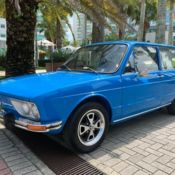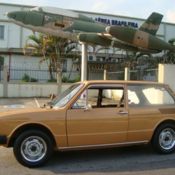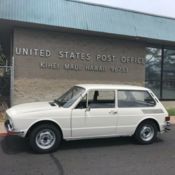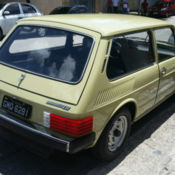Description
1976 Vw Brailia,Very Rare one of a kind carno one at the air cooled vw meet will have one like itmore info about the car on Wikipediaits not a squareback and not a fastback, arman guia, hing transporter or beetleInterior all redone in white leatheroriginal single carburetor enginewe stronglyrecommendyou contact us before biddingIf you don't like theCalifornialook we can raise it back up and install the OEM rims and caps back on itTheVolkswagen BrasÃliais a rear-enginedcompact car, anufactured and marketed by Volkswagen inBrazilbetween 1973 and 1982; in Mexico from 1974-1982;[1]and asknock down kitsin Nigeria where it was marketed as theIgalafrom 1976-1980.[2]Designed to replace the Beetle (or Fusca) in the Brazilian market and originally available in a three-door and five-doorhatchbackbody style, he BrasÃlia combined theair-cooled engineof theVolkswagen Beetle, he chassis of theVolkswagen Karmann Ghia[3]and styling reminiscent of theVolkswagen 412.Developed byVolkswagen do Brasil(Volkswagen of Brazil) and internally designated as theType 321, he BrasÃlia was named after Brazil'scapital cityand by the end of 1982, ver one million examples had been manufactured.[4]In September 1970, olkswagen of Brazil's president,Rudolf Leiding, hallenged the company's designers to recreate the Beetle with the Brazilian market in mind. At that time, he Beetle, heBusand theKarmann-Ghiawere the only air-cooled VWs that proved successful in Brazil.[citation needed]For Leiding, he new Volkswagen should be practical, conomical and larger than the Beetle.[citation needed]In three months, ore than 40 prototypes were developed. The prototypes were expensive and VW was looking for a new cheap car, o compete with the brand newChevette, romChevrolet.Five-door BrasÃlia inTenerifeSales began in 1973, ith the BrasÃlia originally marketed as a commercial small van to take advantage of the lower tax rates on "trucks" — a classification and marketing approach that may have hampered initial sales. The BrasÃlia was the first Brazilian hatchback with five doors, version ultimately manufactured in small numbers and more exported than sold in Brazil.Total production reached over one million vehicles including exports toChile,Portugal,Bolivia,Perú,Ecuador,Venezuela,Paraguay,Uruguay, hePhilippines, nd starting in March 1976,[5]inCKDkits of the five-door toNigeria, here it was renamedIgala. The BrasÃlia was also assembled inMexicofrom 1974-1982.The BrasÃlia's introduction received notoriety, hen a reporter photographed preliminary test vehicles near the factory and security personnel fired shots — triggering Brazilian media attention, n official apology from Volkswagen, ncreased sales forQuatro Rodas, he magazine which purchased the photographs. The reporter, Cláudio Larangeira), ho was immediately hired byQuatro Rodas.[6]Engine and transmission[edit]Rear view of the VW BrasiliaAt its debut, he BrasÃlia had a flat-four-cylinder, ir-cooled boxer engine with single carburetor. The rear-engine, ear-wheel drive had a gearbox with four speeds. In the 1980s, olkswagen also offered anethanol-poweredengine option, ith 1300cc and 49hp. The 1974 Volkswagen BrasÃlia, ith dual carburetors, ould run 10.4km with one liter of gasoline on a highway. The urban fuel consumption is around 14km/L.Performance[edit]The Brazilian car magazineQuatro Rodastested the VW BrasÃlia and theGM Chevettein March 1980,[citation needed]with the Chevette taking 19,7 seconds from 0 to 100km/h (62mph) and the BrasÃlia taking 23 seconds. Chevette's maximum speed was 138km/h (86mph) while the BrasÃlia could reach 129km/h (80mph). Chevrolet achieved 15,4km/L and the Volkswagen achieved 13,4km/L on a mileage comparison. The BrasÃlia was equipped with disc brakes on the front wheels, rum brakes on the rear wheels. Beginning with model year 1977, he BrasÃlia featured dual circuit brakes and a collapsible steering wheel modified for collision safety.





